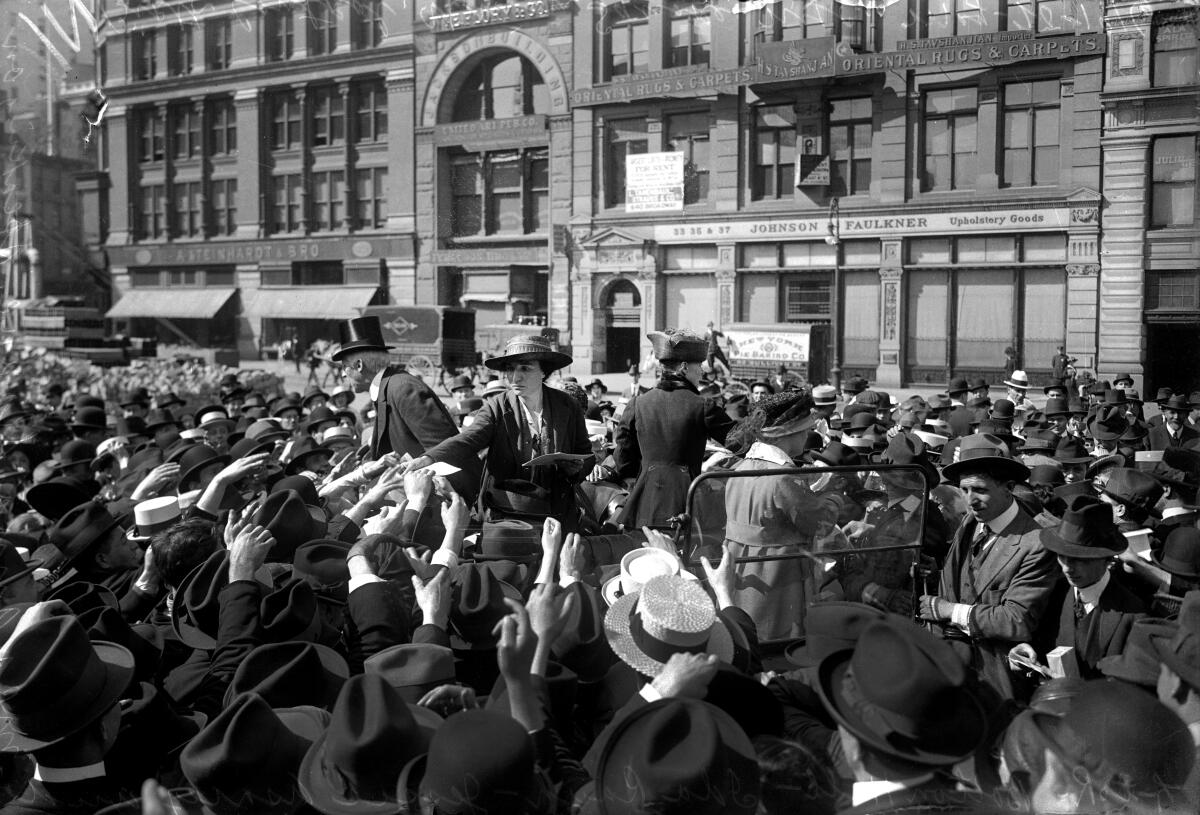Op-Ed: The pendulum is swinging back, reversing hard-won sexual freedoms and civil rights

The leaked Supreme Court opinion by Justice Samuel A. Alito Jr., which would overturn Roe vs. Wade, marks a devastating setback for reproductive justice in the United States. It also highlights how bound up the right to abortion is with other fundamental sexual freedoms and civil rights. Whatever happens in the wake of this likely decision, we are already witnessing the undoing of more than a century of successful efforts to expand and protect individual rights to sexual and gender self-expression.
A decision nullifying Roe could threaten protections for other sexual rights. The majority opinion in Roe in 1973 relied on a right to privacy first established in Griswold vs. Connecticut (1965), which lifted a state ban on contraceptive access for married people. Recognition of a right to privacy also underpinned the court’s decision in Lawrence vs. Texas (2003) to overturn state anti-sodomy statutes. The majority opinion in Obergefell vs. Hodges (2015) likewise cited a right to privacy among its reasons for requiring all states to legalize marriages for same-sex couples. All those cases marked wins for individual liberty, human rights and civil rights.
Whether or not federal protection for abortion rights disappears this year, the erosion of sexual freedoms is already well underway. Although a majority of Americans support abortion rights, several states have passed extraordinarily restrictive abortion laws. School boards have banned books with LGBTQ content. And state legislatures have authorized retaliation against transgender people and their allies — even investigating the parents of children who receive trans-affirming healthcare.
It is not a historical accident that a likely Supreme Court decision to overturn Roe has coincided with these other assaults on sexual freedom and gender identity. The legal right to abortion is but one issue — if a critical one — at the heart of a much larger struggle for sexual autonomy.
That struggle took shape in the wake of another devastating attack: the passage of the Comstock Act in 1873, championed by Anthony Comstock of the New York Society for the Suppression of Vice. Officially the Act for the Suppression of Trade in, and Circulation of, Obscene Literature and Articles of Immoral Use, the law prohibited sending “obscene, lewd, or lascivious” items through the U.S. mail or across state lines. The act defined reproductive technologies and all printed material about contraception as obscene.
Many states had started to outlaw abortion procedures in the 1850s, often due to pressure from (male) physicians determined to undermine a measure typically provided by (female) midwives. The Comstock Act made even the possession of abortifacients a federal crime.
Prudish, sanctimonious and often cruel, Comstock was a “fire and brimstone” Protestant who considered any sex outside of marital reproduction to be sinful. He succeeded in convincing the federal government to impose his religious values on all Americans.
But Comstock’s law did not affirm the status quo. It sought to thwart increasingly permissive sexual values.
Contrary to caricatures of the era, the 19th-century United States was not prudish about sex. A prolific pornography industry enjoyed unprecedented success. Bigamy and divorce had become more common, and Indiana served as the “divorce mill” that Nevada would become decades later. Same-sex couples and queer people lived openly in communities where what mattered was not whether someone conformed to a strict sexual morality but whether they caused any trouble for their neighbors. Most people placed a high premium on privacy.
When Comstock and Congress determined that they had the authority to decide which kinds of sex were moral, and which were not, they upended that equilibrium by authorizing agents of the state to police Americans’ erotic and reproductive lives.
A century of activism defending the individual’s right to sexual self-expression followed. Across multiple movements and battlegrounds, activists have made clear that an overwhelming majority of Americans wanted to make their own decisions about their sexual desires and relationships.
Birth control activists distributed informational pamphlets and opened clinics in defiance of Comstock’s bans on contraception. Lawyers and advocates gradually won carve-outs for physician-directed birth control and the sale of condoms. Bar owners and LGBT activists fought back in court and in the streets against liquor boards and vice squads, eventually refuting the idea that a gathering of LGBT people was by definition obscene. Filmmakers, publishers and others challenged the government’s censorship powers. And by the 1960s, activists took direct aim at laws that criminalized abortion, insisting that sexual freedoms were meaningless if women could not make decisions about whether to carry a pregnancy to term.
Many of us who have benefited from those movements have grown to adulthood expecting to be able to express our gender identities, our sexual desires and our reproductive decisions according to our own consciences. The revelation of the draft opinion to overturn abortion rights should animate anyone in the U.S. who values sexual freedoms. The decision would impose a minority’s interpretation of Christian morality on the nation and render all non-marital non-reproductive sexual expressions vulnerable to policing and prosecution.
The activism that undid the Comstock Act transformed American culture. It ingrained values of sexual autonomy across our social institutions, laws and popular culture. Americans today overwhelmingly support marriage equality, access to contraception, comprehensive sex education and abortion, and they consume sexually explicit material in staggering quantities. In a country where we have grown so accustomed to seeing our sexuality as a core part of our humanity — and as an arena of freedom and expressiveness — we can only hope that it will require far less than a century to undo the damage of an end to Roe.
Rebecca L. Davis, a professor of history at the University of Delaware, is the author of “Public Confessions: The Religious Conversions That Changed American Politics” and is writing a history of sexuality in the U.S.
More to Read
A cure for the common opinion
Get thought-provoking perspectives with our weekly newsletter.
You may occasionally receive promotional content from the Los Angeles Times.










